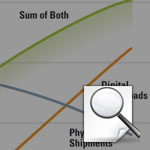What the GDP Gets Wrong (Why Managers Should Care)
The irony: We know less about the sources of value in the economy than we did 25 years ago.
Topics

Image courtesy of Flickr user Fey Ilyas
We see the influence of the information age everywhere, except in the GDP statistics.1 More people than ever are using Wikipedia, Facebook, Craigslist, Pandora, Hulu and Google. Thousands of new information goods and services are introduced each year. Yet, according to the official GDP statistics, the information sector (software, publishing, motion picture and sound recording, broadcasting, telecom, and information and data processing services) is about the same share of the economy as it was 25 years ago — about 4%. How is this possible? Don’t we have access to more information than ever before?
The answer isn’t about quantity, it’s about price. The bits that comprise today’s information goods are supplanting the atoms that formed yesterday’s encyclopedias, movie theaters, music CDs and newspapers. Online information may be updated every minute of the day and accessible almost anywhere in the world, but its price is usually radically lower than that of its physical counterpart, if there even is a price.
The recording industry embodies this trend. In the past few years, consumers have dramatically shifted their music purchases from physical media such as CDs to online sources such as iTunes. (See “Going Digital.”) Consumers have changed their purchasing habits by buying fewer physical units (CDs, cassettes or vinyl records). Sales declined from more than 800 million units in 2004 to just 400 million units in 2008. Contrast that with the vast increase in paid downloads of digital songs. In 2008, more than 1 billion digital single songs were purchased in the United States, as well as more than 50 million digital albums. An even larger number of songs were downloaded illegally, though that’s not reflected in our charts.
Yet this increase in the number of units has not translated into more revenue — in fact, quite the opposite has occurred. Combined revenue from the sale of songs for the record companies went from more than $12.3 billion in 2004 to $7.4 billion in 2008 — a whopping 40% decline. Even if we add digital sales made on mobile phones (which would include ringtones), subscriptions from services such as Napster Inc. or Real Network Inc.�
References
1. Apologies to Bob Solow.


Comments (10)
CreateCo
The best of the web | Forget GDP – Use Big Data
Forget GDP – We Need Numbers That Matter for the Questions We Have | Bamboo Innovator
Forget GDP -- We Need Numbers That Matter for the Questions We Have - Zachary Karabell - Harvard Business Review
Dear New Yorker: Kuznets Did Not Invent GDP (and that matters) | A (Budding) Sociologist's Commonplace Book
Vlad
Vlad
Elizabeth Villagómez
Stuart Ritchie
trev789